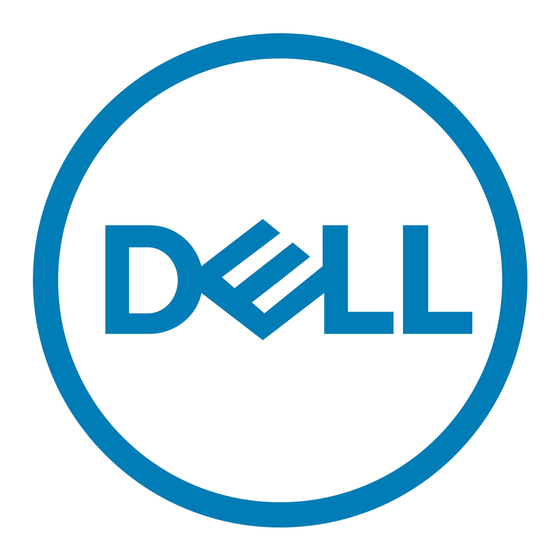Dell DX6000G Manuel d'installation et de configuration - Page 19
Parcourez en ligne ou téléchargez le pdf Manuel d'installation et de configuration pour {nom_de_la_catégorie} Dell DX6000G. Dell DX6000G 23 pages. Rack installation instructions — static rails
Également pour Dell DX6000G : Manuel de l'utilisateur (48 pages), Notes de mise à jour (7 pages), Installation du rack (2 pages), Installation du rack (2 pages)

sudo cfs-admin config
The script will prompt for the CFSID you wish to modify and then display the same prompts from
initial configuration but with the current configuration displayed for each prompt. If you do not wish to
modify a particular parameter, simple press enter and the current value will remain in place. Some
parameters like the configured namespace that might strand or corrupt data are view only.
Note
The share you are attempting to edit must have been mounted at least once prior to
running cfs-admin config to ensure all configuration data is completely populated.
3.5.3.2. cns-admin
If the cns-admin script is re-run after initial configuration, it will prompt for the same questions again
but pre-populate the previously provided values and allow for modifications. The script can be run
using the same command as initial configuration:
sudo cns-admin
At the end, the script will prompt to restart CNS for the new parameters to take effect.
3.5.4. cfs-loglevel
cfs-loglevel is a tool that allows easy access to update the log level for all CFS and CNS logs. From
a command line as a root user, type 'cfs-loglevel', then select the desired log level from the dialog
box and click 'Ok'. The log level will be updated in the configuration files for both CFS and CNS and
will take effect immediately with no required process restart.
3.6. DX Storage Metadata and Policies
Along with the standard file system attributes that are associated with a file stored in DX Storage
CFS, additional metadata and lifecycle policies can be stored with files when they are stored in DX
Storage. This metadata can assist with storage management and data movement through various
life cycles. All metadata and policies are specific to DX Storage and are not visible from within the
file system.
Metadata and policies are specific to each mountpoint so it is advisable to configure separate
mountpoints in cases where distinct metadata values would be helpful. For instance, to distribute
content based on the branch office a file originated from, set up a mountpoint for each branch office
and add a custom metadata attribute with the branch office name that would be added to each file
stored. Similarly, to store more replicas of files needed by the Media department due to frequent
read activity, setup a separate mountpoint for the Media department with a Lifecycle policy for
additional replicas and leave all other departments utilizing a mountpoint with a lifepoint policy for
fewer replicas.
As a baseline for file metadata, DX Storage CFS will automatically add the following system
attributes on all streams stored in DX Storage:
• Castor-CFS-Server: the name of the server from which the file was originally stored
• Castor-CFS-Version: the version of the CFS software that originally stored the file
• Content-Type: the file's mimetype
• CAStor-CFS-CFSID: the name of the mountpoint id through which the file was originally stored
Copyright © 2011 Caringo, Inc.
All rights reserved
16
Version 2.6
February 2011
